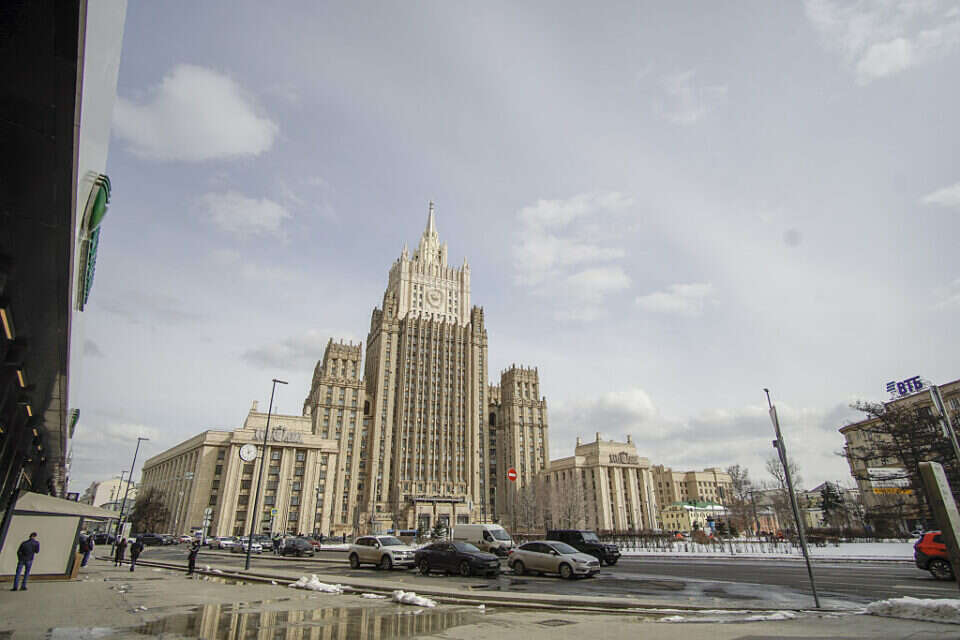In the last month it seems that not a week can pass without Russia demonstrating its hostility towards Israel, more than once under the guise of anti-Semitism or holocaust.
Russian Foreign Minister Lavrov.
Dwarfs the Holocaust, photo: Reuters
Three weeks ago, it was Foreign Minister Lavrov who called US aid to Ukraine "an attempt to reach the final solution of the Russian question" (and drew condemnation for the comparison); a few days later, Russia reprimanded Germany for siding with Israel at the Hague Tribunal; on Saturday night he published The Ministry of Foreign Affairs in Moscow made a statement mocking Israel's difficulty in freeing hostages; and yesterday it was the turn of Israel's ambassador to Moscow, Simona Halperin, to become personally aware of the bullying of the (not really) diplomatic service from Smolenskaya Square.
Ambassador Halperin and military attache Boris Schuster place a wreath at the Museum of Judaism and Tolerance in Moscow, last month, photo: AFP
Halperin was summoned to a conversation in the Stalinist skyscraper "due to public statements that distort Russian foreign policy and historical reality."
According to the TASS news agency, the ministry "was especially angry that the Israeli ambassador speaks disrespectfully about the efforts that Russia is making to help free the abductees."
What exactly did the ambassador say?
In an interview with "Kommersant", Halperin dared to point out simple facts: Russia for a long time avoided condemning the massacre on October 7 and even calling it an "attack", regularly delays Hamas "and hugs its heads", claims that it is conducting negotiations for the release of the abductees but "people remain In captivity for four months," and in general does not utter a single word of criticism against Hamas, Hezbollah and the Houthis.
But according to the Russians' statement, Halperin's words regarding the Holocaust caused "special anger".
"Unfortunately, International Holocaust Day is not officially marked in the state calendar of the Russian Federation," the ambassador said.
"It's not really clear to me why Foreign Minister Sergei Lavrov downplays the significance of this monstrous event (the Holocaust; Div).
Yes, many nations suffered many losses, the Russian people paid in millions of people for the victory over the Nazis.
And we remember that.
However, the world has never known such total and planned extermination solely according to national identification.
Only the Jewish people went through that."
🇷🇺🇮🇱 On December 28, the special representative of the President of Russia for the Middle East and African countries, the Deputy Minister of Foreign Affairs of Russia, Mikhail Bogdanov, received the appointed Ambassador of the State of Israel in Moscow, Simona Galperin.
📃 Copies of credentials were handed over.
pic.twitter.com/qHl4fX13nY
— МИД России 🇷🇺 (@MID_RF) December 28, 2023
Why exactly does this passage upset the Russians?
In recent years, as the Putin regime increasingly presented Russia as the rival of the West and the successor-successor of the USSR, various Soviet motifs also returned to the public discourse - including the approach to the Holocaust. Although more than 1.2 Jews were exterminated on the territory of the USSR, the official Soviet historiography forbade to treat it as a separate event, and the Jews, despite the distinct differences in the Nazis' attitude towards them, were counted among the "victims of the Soviet nation in the war against fascism".
The insistence on the uniqueness of the Holocaust contradicts the new-old narrative in Moscow, and also clarifies the Kremlin's free use of the tragedy for its own purposes - for example to paint the democratic West as "new Nazis", and Russia - as a kind of "Jews" persecuted by it.
The deteriorating relations between Russia and Israel since October 7 - the delay in condemnation, the anti-Israeli propaganda, the holocaust, and other shameful things - pose a significant challenge to Israeli diplomacy going forward.
But in retrospect, the impression only gets stronger of how dubious were the rations of legitimacy that Israel presented to Putin for invading Ukraine - beginning with the mass demonstration of our elected officials and officials at the embassy in Jerusalem, through the concessions for the opening of the consulate in Jerusalem, and ending with the strange agreement for cooperation in the cinema.
As much as Israel tried to maintain neutrality, when Russia decided - it marked Israel as part of the West and threw it under the bus.
Except for short periods of time, Moscow was and still is part of the camp that is hostile to Israel, and in time will turn its back on it, and maybe even stick a knife in its back.
Were we wrong?
We will fix it!
If you found an error in the article, we would appreciate it if you shared it with us

